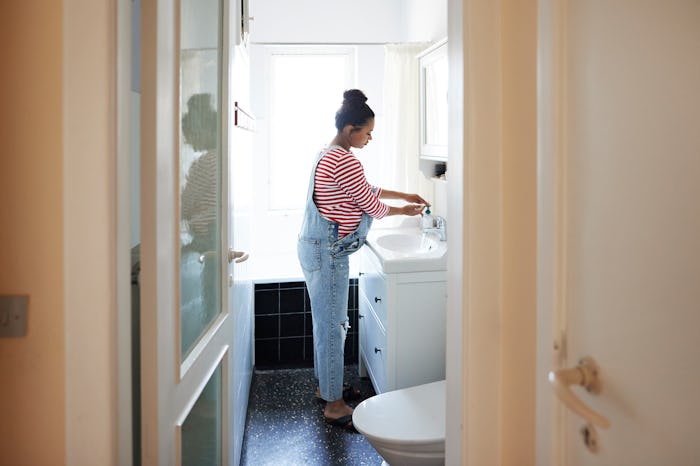Expecting

4 Pregnancy-Safe Hand Soaps
There are some ingredients you should avoid.
You’ve probably heard by now that it’s best to avoid sushi and cold cuts while pregnant, along with hot yoga, horseback riding, and retinol (I don’t make the rules here). What you may not know is that some hand soaps are actually not safe for pregnancy either. While you don’t need to freak out every time you wash your hands in a public place (and sometimes you just need to use the soap that’s available), here two dermatologists explain what soap ingredients to avoid when you’re expecting, and how to find pregnancy-safe hand soaps.
Is hand soap safe for pregnancy?
Many hand soaps are totally safe for pregnancy, which is a good thing because we need to do a lot of hand-washing these days. And because pregnant women are more likely to get severely ill from respiratory illnesses, per the Centers for Disease Control and Prevention (CDC), regular hand-washing is a good way to help prevent colds and other illness. However, there are some ingredients in soap you’ll want to avoid if you can.
“Triclosan and triclocarban are common ingredients in hand soaps that are not safe to use during pregnancy,” board-certified dermatologist, Dr. Marina Peredo tells Romper. “When pregnant women used hand soaps with these ingredients in them, they were found in the women’s urine and in umbilical cord blood samples.” These two ingredients are usually found in soap specifically labeled “antibacterial.” Triclosan, which is found in some liquid soaps, and triclocarban, which is in some bar soaps, are endocrine disruptors, meaning they affect hormones, including those that regulate baby’s growth. The good news is that these ingredients were banned by the U.S. Food and Drug Administration (FDA) in 2016, so they shouldn’t be in hand soap anymore (though sometimes the removal process can be slow). The other good news is that the FDA also found that plain old soap (not antibacterial) and water was just as effective at killing germs.
Are soaps with essential oils okay during pregnancy?
You may think because many soaps made with essential oils are often billed as “natural” that they’re fine for pregnancy, but it turns out you’ll probably want to ditch the heavily scented hand soaps too — and not just because strong smells can be tough when you’re expecting. “Heavily fragrant soaps should not be used in pregnancy. Some essential oils like lavender can have hormone disruptive effects,” Dr. Sandy Skotnicki, dermatologist and author of Beyond Soap says, and the same is true of tea tree oil. It’s been speculated that certain essential oils (like clary sage) can jumpstart labor due to the release of oxytocin in the brain (which is though to spur contractions), and while that’s still up for debate, many oils haven’t been studied enough in pregnancy to know for sure how they affect both mom and baby. Using small amounts of essential oils is likely fine, though it’s always a good idea to check in with your OB about the specific scent and any potential interactions.
When looking for a soap that does not contain any fragrance, it’s best to opt for one that’s labelled “fragrance-free” as “unscented” sometimes means the product contains chemicals to mask smell.
Pregnancy-safe hand soaps
“Using an organic, paraben-free hand soap is ideal. I like Cetaphil or CeraVe. It is paraben-free and has no artificial coloring and phthalates,” Peredo says. Skotnicki tells Romper that her favorites are CeraVe bar soap and Cetaphil Restoraderm Wash, plus Aveeno products, and Uriage Cleansing Oil (which can be used on the hands and is great for dryness). Hand washes designed for babies and children are also typically pregnancy-safe.
We at Romper only include products that have been independently selected by our editors. We may receive a portion of sales if you purchase a product through a link in this article.
Rest assured that if you’re in a public restroom and aren’t sure what’s in the hand soap, it’s still best to wash your hands. Triclosan and triclocarban have likely been phased out of most products by now, and even in the event that they are present, it’s such a minimal exposure. But at home where you can control the soap, opt for a soap that’s fragrance-free and from a derm-recommended brand.
Studies referenced:
Ramsey J, et al. (2019). Lavender products associated with premature thelarche and prepubertal gynecomastia. https://pubmed.ncbi.nlm.nih.gov/31393563/
Tadokoro Y, et al. (2017). Changes in salivary oxytocin after inhalation of clary sage essential oil scent in term-pregnant women. https://www.ncbi.nlm.nih.gov/pmc/articles/PMC5721455/
Experts:
Dr. Marina Peredo, M.D., board-certified dermatologist
Dr. Sandy Skotnicki, M.D., board-certified dermatologist and author of Beyond Soap